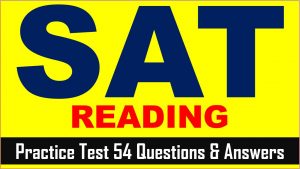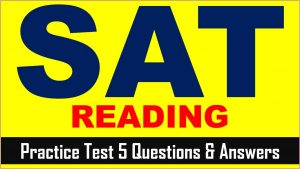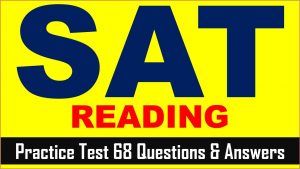SAT (Scholastic Assessment Test) is a standard test, used for taking admission to undergraduate programs of universities or colleges of the United States. SAT is developed and published by the College Board, an organization in the United States, administered by the Educational Testing Service. In this article of AKVTutorials, you will get Princeton SAT Prep Plus Course Book Review | Practice Test 29 AMBiPi.
Princeton SAT Prep Plus Course Book Review
The Princeton Review for SAT Premium Book review is given in the article Click Here.
Check Price On Amazon
SAT Reading Practice Passage
Passage 1 is adapted from Abraham Lincoln, “Address to the Young Men’s Lyceum of Springfield, Illinois.” Originally delivered in 1838. Passage 2 is from Henry David Thoreau, “Resistance to Civil Government.” Originally published in 1849.
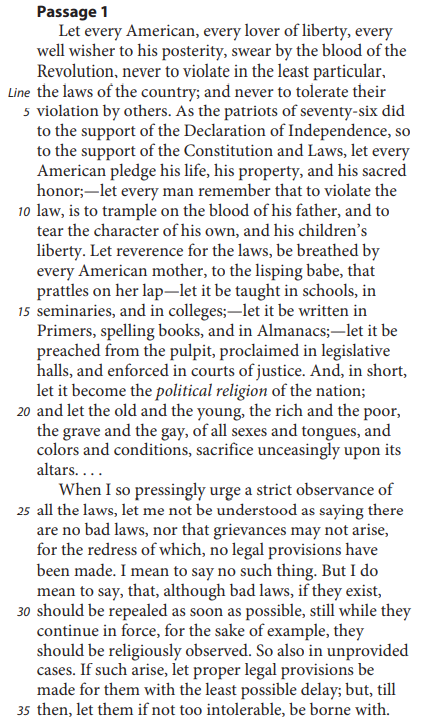
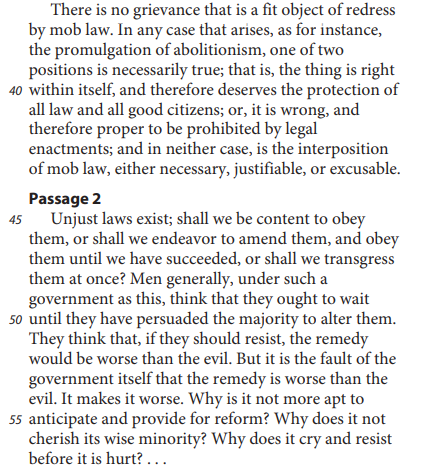
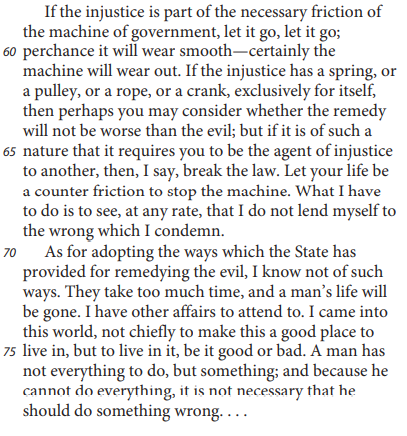
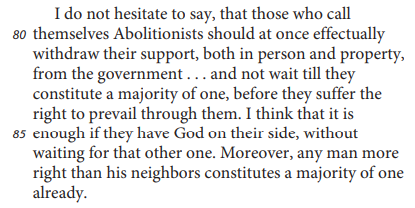
SAT Reading Comprehension Practice Test Questions
SAT Practice Test 29 Question No 1
In Passage 1, Lincoln contends that breaking the law has which consequence?
Option A: It slows the repeal of bad laws.
Option B: It undermines and repudiates the nation’s values.
Option C: It leads slowly but inexorably to rule by the mob.
Option D: It creates divisions between social groups.
SAT Practice Test 29 Answer No 1
Show/Hide Answer
Option B :
In Passage 1, Lincoln asserts that citizens of the United States should never break the laws of their land, for any reason, because to do so undermines the nation’s values. This is demonstrated when he says, “let every man remember that to violate the law, is to trample on the blood of his father, and to tear the character of his own, and his children’s liberty” (lines 9-12).
Choice A is incorrect because Lincoln says that bad laws “should be repealed as soon as possible” (line 30), not that breaking the law would slow their repeals. Choice C is incorrect because Lincoln says that “there is no grievance that is a fit object of redress by mob law” (lines 36-37) but doesn’t argue that breaking the law will lead to mob rule. Choice D is incorrect because in his speech Lincoln doesn’t discuss divisions between social groups.
SAT Practice Test 29 Question No 2
Which choice provides the best evidence for the answer to the previous question?
Option A: Lines 9-12 (“let every man… liberty”)
Option B: Lines 20-23 (“and let… altars”)
Option C: Lines 33-35 (“If such… borne with”)
Option D: Lines 36-37 (“There… law”)
SAT Practice Test 29 Answer No 2
Show/Hide Answer
Option A :
The previous question asks what Lincoln believes is the result of breaking the laws, with the answer being that such actions undermine a nation’s values. This is supported in lines 9-12: “Let every man remember that to violate the law, is to trample on the blood of his father, and to tear the character of his own, and his children’s liberty.”
Choices B, C, and D are incorrect because the lines cited do not support the answer to the previous question regarding what Lincoln contends happens when citizens break the law, instead of explaining exactly which groups Lincoln believes should vow to follow the laws (choice B), illustrating how Lincoln believes unjust laws should be dealt with (choice C), and stating Lincoln’s belief that no law is ever improved through mob rule (choice D).
SAT Practice Test 29 Question No 3
As used in line 24, “urge” most nearly means
Option A: hasten.
Option B: stimulate.
Option C: require.
Option D: advocate.
SAT Practice Test 29 Answer No 3
Show/Hide Answer
Option D :
In lines 24-25, Lincoln says, “I so pressingly urge a strict observance of all the laws.” In this context, the word “urge” most nearly means advocate, because when Lincoln urges people to obey the laws, he is pleading in favor of them doing so.
Choices A and C are incorrect because in the context of lines 24-25 (“I so pressingly urge a strict observance of all the laws”), to urge that laws be followed is to advocate for them to be obeyed, not to speed up such adherence (choice A) or make such adherence necessary (choice C). Choice B is incorrect because Lincoln is asking people to follow the laws but not directly causing people to obey them.
SAT Practice Test 29 Question No 4
The sentence in lines 24-28 (“When… made”) primarily serves which function in Passage 1?
Option A: It raises and refutes a potential counterargument to Lincoln’s argument.
Option B: It identifies and concedes a crucial shortcoming of Lincoln’s argument.
Option C: It acknowledges and substantiates a central assumption of Lincoln’s argument.
Option D: It anticipates and corrects a possible misinterpretation of Lincoln’s argument.
SAT Practice Test 29 Answer No 4
Show/Hide Answer
Option D :
After advocating for citizens “never to violate in the least particular, the laws of the country” (lines 3-4), Lincoln begins the second paragraph by making another point: “When I so pressingly urge a strict observance of all the laws, let me not be understood as saying there are no bad laws, nor those grievances may not arise, for the redress of which, no legal provisions have been made” (lines 24-28). This sentence is an attempt on Lincoln’s part to make clear what could be a misunderstanding of his position (“let me not be understood”) and to correct that possible misunderstanding. Lincoln doesn’t want people to believe he is saying all laws are always good, but rather that those laws need to be followed as long as they are on the books.
Choices A and B are incorrect because the sentence in lines 24-28 does not raise and refute a possible counterargument to Lincoln’s argument or identify a shortcoming of his argument, but rather it is an attempt on Lincoln’s part to make sure he is not misunderstood. Choice C is incorrect because that sentence does not acknowledge and provide support for a central assumption of Lincoln’s argument but looks at a different aspect of the issue.
SAT Practice Test 29 Question No 5
As used in line 32, “observed” most nearly means
Option A: followed.
Option B: scrutinized.
Option C: contemplated.
Option D: noticed.
SAT Practice Test 29 Answer No 5
Show/Hide Answer
Option A :
In the passage, Lincoln states his belief that any laws that “continue in force, for the sake of example, they should be religiously observed” (lines 31-32). In this context, “observed” most nearly means followed, as Lincoln is urging citizens to heed or follow the country’s laws.
Choices B, C, and D are incorrect because in the context of Lincoln advocating that laws be religiously “observed,” he means those laws should be followed, not that they should be studied closely (choice B), considered at length (choice C), or merely recognized (choice D).
SAT Practice Test 29 Question No 6
In Passage 2, Thoreau indicates that some unjust aspects of government are
Option A: superficial and can be fixed easily.
Option B: subtle and must be studied carefully.
Option C: self-correcting and may be beneficial.
Option D: inevitable and should be endured.
SAT Practice Test 29 Answer No 6
Show/Hide Answer
Option D :
Passage 2 begins with Thoreau’s statement that “unjust laws exist” (line 45). His philosophy regarding how to deal with those unjust laws is evident in lines 58-59: “If the injustice is part of the necessary friction of the machine of government, let it go, let it go.” Thoreau believes, in other words, that some injustices are an unfortunate part of normal governance and just need to be endured (“let it go, let it go”).
Choice A is incorrect because Thoreau does not say some unjust aspects of government can be fixed easily or that they are merely superficial. Choice B is incorrect because Thoreau does not argue that such injustices are subtle and should be studied, but rather that in certain cases it is best to “let it go, let it go” (line 59), while in other cases one should act or “break the law” (line 66). Choice C is incorrect because Thoreau does not say that any such unjust aspects of government are beneficial.
SAT Practice Test 29 Question No 7
Which choice provides the best evidence for the answer to the previous question?
Option A: Lines 45-48 (“Unjust… once”)
Option B: Lines 51-52 (“They… evil”)
Option C: Lines 58-59 (“If the injustice… go”)
Option D: Lines 75-78 (“A man… wrong”)
SAT Practice Test 29 Answer No 7
Show/Hide Answer
Option C :
The previous question asks what Thoreau feels about some unjust aspects of government, with the answer being that he finds them inevitable and something that needs to be endured. This is supported in lines 58-59: “If the injustice is part of the necessary friction of the machine of government, let it go, let it go.”
Choices A, B, and D are incorrect because the lines cited do not support the answer to the previous question about Thoreau’s thoughts regarding certain injustices in government, instead of asking a theoretical question about how one should respond to unjust laws (choice A), providing an observation about how some view acting out against unjust laws (choice B) and acknowledging that in some questions of conscience, one may or may not choose to act (choice D).
SAT Practice Test 29 Question No 8
The primary purpose of each passage is to
Option A: make an argument about the difference between legal duties and moral imperatives.
Option B: discuss how laws ought to be enacted and changed in a democracy.
Option C: advance a view regarding whether individuals should follow all of the country’s laws.
Option D: articulate standards by which laws can be evaluated as just or unjust.
SAT Practice Test 29 Answer No 8
Show/Hide Answer
Option C :
In Passage 1, Lincoln makes clear his belief that individuals should always heed the laws: “Let every American . . . swear . . . never to violate in the least particular, the laws of the country” (lines 1-4). Even bad laws, he states, “while they continue in force, for the sake of example, they should be religiously observed” (lines 30-32). In Passage 2, Thoreau is less rigid in his beliefs regarding the need for individuals to heed the laws of the country, arguing at times that some laws should be broken: “but if it is of such a nature that it requires you to be the agent of injustice to another, then, I say, break the law” (lines 64-66). While Lincoln and Thoreau can therefore be said to disagree about the moral imperative to follow existing laws, both passages advance an opinion regarding the need to follow or not follow all of the country’s laws.
Choice A is incorrect because the passages are not making arguments about differences between legal duties and moral imperatives but rather are addressing the need to follow (or not) the laws of the land. Choice B is incorrect. Both passages address the question of changing existing laws in the United States, but that is only a minor part of what is a greater debate about the need to follow or not follow existing laws. Choice D is incorrect because neither passage addresses the standards for determining whether or not laws are just, only whether laws should be heeded or not.
SAT Practice Test 29 Question No 9
Based on the passages, Lincoln would most likely describe the behavior that Thoreau recommends in lines 64-66 (“if it… law”) as
Option A: an excusable reaction to an intolerable situation.
Option B: a rejection of the country’s proper forms of remedy.
Option C: an honorable response to an unjust law.
Option D: a misapplication of a core principle of the Constitution.
SAT Practice Test 29 Answer No 9
Show/Hide Answer
Option B :
In Passage 2, Thoreau says that if a law “is of such a nature that it requires you to be the agent of injustice to another, then, I say, break the law” (lines 64-66). It is clear from Passage 1 that Lincoln would reject this stance, as he says individuals should never break the law (“Let every American . . . swear . . . never to violate in the least particular, the laws of the country,” lines 1-4) and should wait for a bad law to be repealed (“bad laws, if they exist, should be repealed . . . still while they continue . . . they should be religiously observed,” lines 29-32).
Choices A and C are incorrect because, in Passage 1, Lincoln is absolutely clear that all laws “should be religiously observed” (line 32); he does not describe anyone’s suggestion to break the law as either excusable (choice A) or honorable (choice C). Choice D is incorrect because it is not supported by the passage, as Lincoln does not discuss the core principles of the Constitution in Passage 1.
SAT Practice Test 29 Question No 10
Based on the passages, one commonality in the stances Lincoln and Thoreau take toward abolitionism is that
Option A: both authors see the cause as warranting drastic action.
Option B: both authors view the cause as central to their argument.
Option C: neither author expects the cause to win widespread acceptance.
Option D: neither author embraces the cause as his own.
SAT Practice Test 29 Answer No 10
Show/Hide Answer
Option D :
In Passage 1, Lincoln uses abolitionism solely as an example to illustrate the argument he is making about heeding the law: “In any case that arises, for instance, the promulgation of abolitionism, one of two positions is necessarily true” (lines 37-39). In Passage 2, Thoreau does the same thing by noting that “those who call themselves Abolitionists should at once effectually withdraw their support . . . from the government” (lines 79-82). Although Lincoln and Thoreau use the cause of abolitionism to argue different points, a commonality they share is that neither embraces the cause personally in the passage; Lincoln simply uses it as an example (“for instance”) while Thoreau specifically talks of other people “who call themselves Abolitionists.”
Choice A is incorrect because in Passage 1, Lincoln argues against drastic action, saying that even in the case of abolitionism, such a response is not “necessary, justifiable, or excusable” (line 44). Choice B is incorrect because it’s not accurate to say abolitionism was central to the arguments, only that each user that subject as an example. Choice C is incorrect because neither Lincoln nor Thoreau offers an opinion about whether or not abolitionism will gain widespread acceptance, instead, they incorporate it only as an example in their discussions of just and unjust laws.
The Princeton Review for SAT Premium Book review is given in the article Click Here.
Check Price On Amazon


